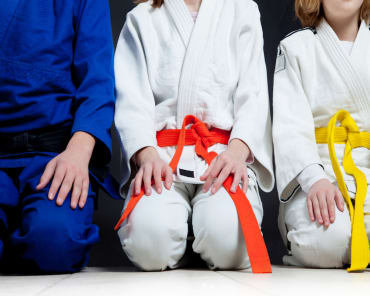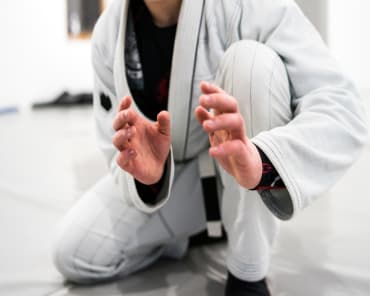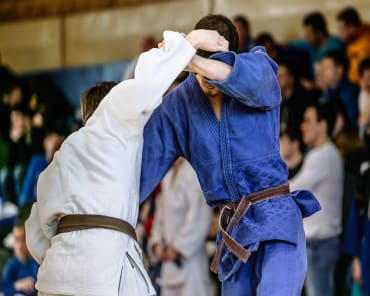
Jiu-Jitsu is often referred to as a game of chess on the mats—a physical and mental test that challenges practitioners to think strategically while managing both success and failure. While physical strength and technique are essential components of Brazilian Jiu-Jitsu (BJJ), cultivating a strong mindset is equally critical to long-term success. The mental challenges of Jiu-Jitsu are numerous, from enduring tough sparring sessions to overcoming self-doubt and frustration. Developing a resilient, growth-oriented mindset is key to thriving in this martial art.
In this blog, we’ll explore the mental challenges that arise in Jiu-Jitsu and how students can cultivate the mental toughness and resilience needed to overcome obstacles, improve consistently, and enjoy the journey.
1. Embrace the Learning Process
One of the biggest mental hurdles for many Jiu-Jitsu practitioners is the slow, often nonlinear learning curve. In BJJ, progress can feel painstakingly slow, especially when compared to other sports or fitness activities. You might attend class regularly, drill techniques, and roll hard, yet feel like you’re not advancing. This can be incredibly frustrating, especially for beginners who expect rapid improvement.
To develop a strong mindset, it’s essential to embrace the learning process and understand that mastery takes time. Jiu-Jitsu is a lifelong journey where every training session, roll, and experience on the mat contributes to your growth—even when it feels like you’re stuck. Shifting your mindset from a “destination” mentality to one that values continuous learning will help you remain patient and resilient when progress seems slow.
Tips for embracing the learning process:
- View setbacks as opportunities for growth rather than failures.
- Celebrate small victories, such as grasping a new technique or surviving a tough roll.
- Remind yourself that every black belt started as a beginner and faced the same challenges.
2. Build Resilience Through Failure
Failure is an inevitable part of Jiu-Jitsu. You will get submitted, out-positioned, and outmatched—often by people who seem far ahead of you in skill and experience. The key to developing a strong mindset is learning how to handle these moments of defeat and bounce back stronger.
Instead of viewing failure as a negative experience, treat it as an opportunity to learn. Each submission or mistake teaches you something about your weaknesses and offers insight into how you can improve. The more comfortable you become with failure, the easier it will be to take risks and step outside your comfort zone, which is essential for growth in BJJ.
Tips for building resilience through failure:
- Reflect on what went wrong and how you can adjust your approach in future rolls.
- Develop the habit of learning from every mistake, no matter how small.
- Understand that getting submitted is part of the process, not a sign of weakness.
3. Stay Present and Focused
Mental toughness in Jiu-Jitsu requires the ability to stay present and focused, especially during challenging moments. Whether you’re struggling to escape a bad position, managing exhaustion during a sparring session, or working through complex techniques in class, maintaining mental clarity and focus is essential.
The practice of mindfulness—staying in the moment without letting your mind wander—can help you remain calm under pressure and make better decisions during training and competition. When you stay present, you’re able to assess your situation more clearly, focus on your immediate goals, and make smarter tactical decisions.
Tips for staying present on the mat:
- Focus on your breathing during challenging moments to maintain a calm and steady mindset.
- Pay attention to the details of your technique, avoiding distractions or overthinking past mistakes.
- Practice visualization to prepare mentally for specific situations, such as escaping bad positions or executing submissions.
4. Develop a Growth Mindset
A growth mindset is the belief that your abilities and intelligence can be developed through hard work, practice, and perseverance. In Jiu-Jitsu, adopting a growth mindset is crucial to long-term success and resilience. This mindset encourages you to see challenges as opportunities for improvement and to embrace feedback as a valuable tool for growth.
Rather than focusing solely on winning or losing, a growth mindset emphasizes learning and improvement. Practitioners with a growth mindset are more likely to take on difficult challenges, persist in the face of setbacks, and remain motivated even when progress is slow.
How to cultivate a growth mindset in Jiu-Jitsu:
- Accept constructive criticism and feedback from instructors and training partners.
- Focus on effort and improvement rather than innate talent or immediate success.
- View plateaus as a natural part of the learning process, not as an indication of failure.
5. Manage Frustration and Self-Doubt
Jiu-Jitsu can be mentally taxing, particularly when faced with frustration or self-doubt. It’s easy to feel discouraged after tough sparring sessions, especially if you’re repeatedly getting submitted or struggling to execute techniques. These feelings are natural, but developing mental toughness means learning how to manage them effectively.
One effective way to manage frustration is to focus on the bigger picture. Remember that everyone experiences tough rolls, and even seasoned practitioners have days when nothing seems to go right. Instead of getting caught up in negative emotions, focus on what you can control—your effort, your attitude, and your ability to keep learning.
Strategies to manage frustration and self-doubt:
- Acknowledge your emotions without letting them dictate your actions. It’s okay to feel frustrated, but don’t let it cause you to give up.
- Keep perspective: Remind yourself that you’re training to improve, not to win every roll or execute every technique perfectly.
- Surround yourself with supportive teammates and instructors who can provide encouragement and constructive feedback.
6. Consistency is Key
Consistency is one of the most important factors in developing both physical and mental strength in Jiu-Jitsu. Training regularly, even when you don’t feel motivated or when progress is slow, is essential to building resilience. The more you show up and push through challenging times, the stronger your mindset will become.
Over time, consistency breeds confidence. As you consistently practice, you’ll see improvements in your technique, your fitness, and your mental toughness. This builds a positive feedback loop, where your confidence reinforces your commitment to training, and your commitment leads to further improvements.
Tips for staying consistent:
- Create a training schedule and stick to it, even on days when you feel discouraged.
- Set small, attainable goals to keep yourself motivated and focused.
- Recognize that every day on the mat, no matter how difficult, brings you one step closer to your long-term goals.
Conclusion
Developing a strong mindset in Jiu-Jitsu is just as important as mastering techniques and building physical strength. The mental challenges of BJJ—whether it’s dealing with failure, managing frustration, or staying focused during tough rolls—are opportunities for growth. By embracing the learning process, building resilience, and adopting a growth mindset, you can cultivate the mental toughness needed to thrive in Jiu-Jitsu and beyond. With time, patience, and consistency, you’ll not only improve your skills but also develop the mental fortitude to overcome any challenge that comes your way.






